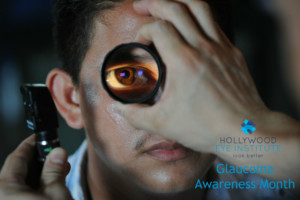At the Hollywood Eye Institute, our goal is to diagnose every ocular condition and provide the best possible treatment to our patients. Ee would like to bring glaucoma awareness to an ocular condition that affects more than 3 million Americans, Glaucoma. The best way HEI can combat Glaucoma is to diagnose every at-risk patient. To honor Glaucoma awareness month, we are going to educate you on the effects and proper treatment for the condition.

What is Glaucoma?
Glaucoma is a complex disease in which damage to the optic nerve leads to progressive, irreversible vision loss. Glaucoma is a leading cause of irreversible blindness in the United States. In the U.S., more than 120,000 are blind from glaucoma, accounting for 9% to 12% of all cases of blindness. Inmost cases, Glaucoma has no early warning signs or painful symptoms of open-angle glaucoma. It develops slowly and sometimes without noticeable sight loss for many years.
Glaucoma comes in three major types: open-angle (chronic), angle-closure (acute), and congenital.
- Open-Angle glaucoma is the most common form. There are typically no early warning signs; the only sign is gradual vision loss. This is when the pressure in the eye continues to slowly build over time changing the optic nerve due to the pressure pushing against the nerve.
- Angle-closure glaucoma is quick, severe and painful with the rise of pressure in the eye. If angle-closure is detected in one eye, there is also a risk for obtaining it in the other eye.
- Congenital glaucoma is often hereditary and is detected slightly after birth; this type is caused by abnormal eye development.
For example, many people who have open-angle glaucoma feel no symptoms and do not notice a change in their vision at first because the initial loss of vision is of side or peripheral vision, and the visual acuity or sharpness of vision is maintained until late in the disease. Typically, when an individual becomes aware of their vision loss, the disease is an advanced state. Without proper treatment, glaucoma can lead to blindness.
How do you treat glaucoma?
Glaucoma can be treated, but it is not curable. The damage to the optic nerve from glaucoma cannot be reversed. However, lowering the pressure in the eye can help prevent further damage to the optic nerve and further peripheral vision loss.
Treatments for Glaucoma include medicines, laser trabeculoplasty, conventional surgery, or a combination of any of these. These treatments don’t improve any vision loss from glaucoma; however, they can help save remaining vision.
Contact Us
Ultimately, the best preventive care for the disease is regular eye exams, early detection, and treatment, you can preserve your vision.
Concerned about Glaucoma? Find out by receiving a consultation at our Hollywood office. Our comprehensive eye exams may be covered under your insurance. To learn more, contact our office at (954) 447-0606 or click here.
